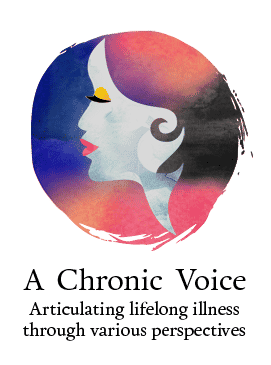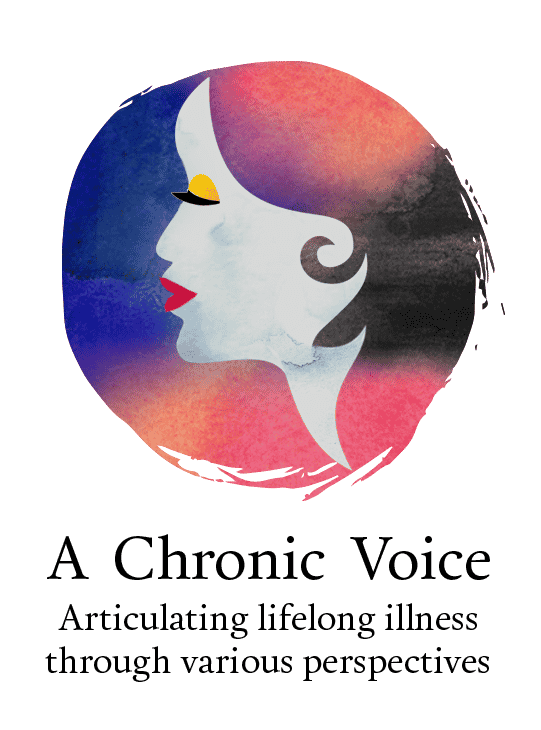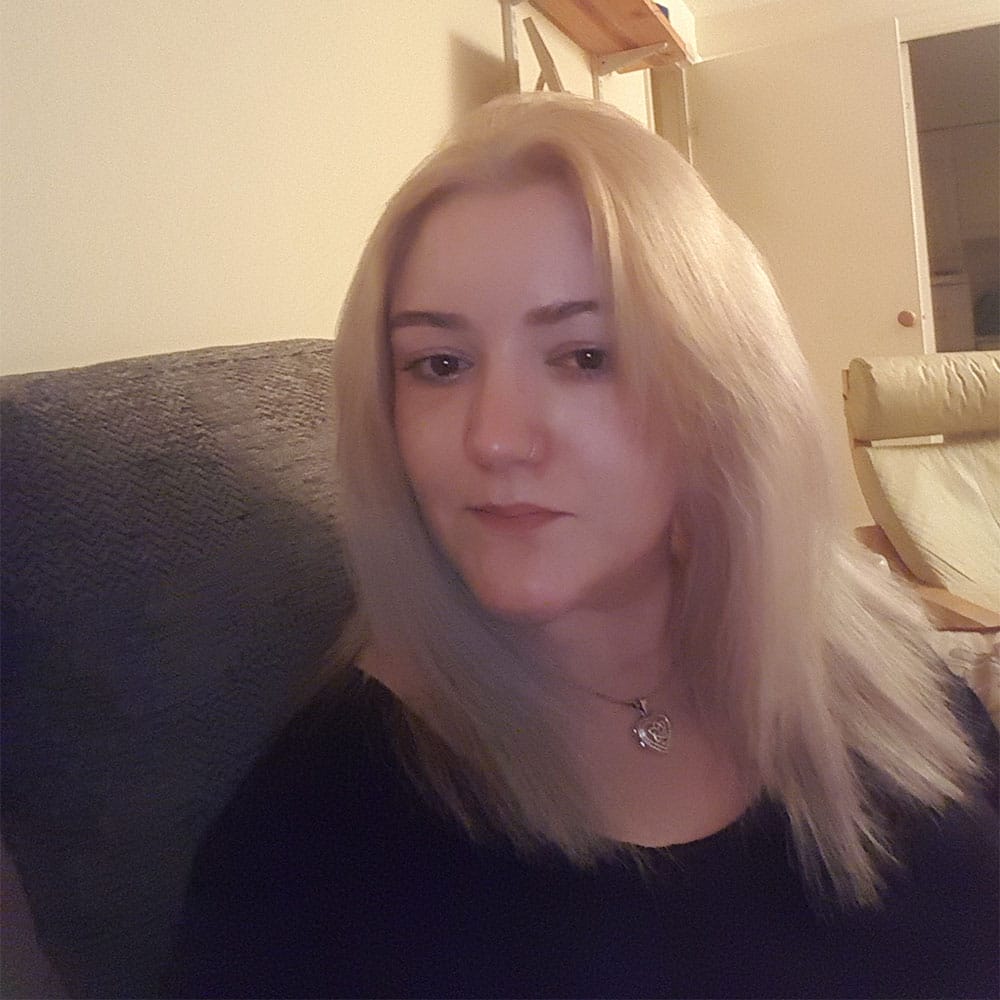*Note from A Chronic Voice: Lucy first interviewed me for her blog, which inspired me to conduct a couple of them myself. My hope is to expand this blog to include many other voices other than my own. Every life story is unique, and the way we experience it is also very different. While Lucy and I chat about various aspects of living with chronic illnesses, the information here might be especially of interest to those who live with thyroid disorders. Without further ado, here’s Lucy for you:
1. Hi Lucy! Would you like to begin by sharing a little about your blog and yourself?
I was diagnosed with Graves disease (hyperthyroidism) in about 2012. It came about really unexpectedly. I had changed doctors, and in order to register with the new GP I had to do some basic tests, urine sample, heart monitoring etc. The nurse noticed my pulse was racing and did the ECG three times. Each time my pulse went even faster. She referred me to have blood tests. I was called back the same day and told I needed to attend the doctor’s urgently.
I was absolutely freaking out. I was told then that I had Hyperthyroid and graves disease and my levels were dangerously high. I was put on Carbimazole (anti thyroid meds) straight away and referred to an Endocrinologist.
My levels never normalised. I had been fighting for 18 months and eventually opted to have my thyroid totally removed. I was advised that once my thyroid was removed, I would start recovery pretty much straight away. Their exact words were “you will need to levothyroxine for the rest of your life, but you will feel so much better and you can have a normal life”.
I wasn’t aware at the time, that this was a huge lie. Even on thyroxine my levels never stabilised. I felt awful. My body felt like it was falling apart. I felt worse on thyroxine than when I was hyper.
I had my gallbladder removed, contacted sepsis from the operation. I was diagnosed with Fibromyalgia and Gastroesophageal Reflux Disorder as well. Those combined with an anxiety disorder which in turn set about Obsessive Compulsive Disorder. My head was a mess. All I did was sleep.
It was then I started researching for myself. The internet became my friend. I learned that thyroxine didn’t work for a lot of thyroid patients. I wasn’t the only one.
Neither my GP nor Endocrinologist told me that reflux disorder prevents thyroxine from absorbing, nor did they mention anything about varying levels of Thyroid hormone that that are needed to maintain healthy and optimum levels. These can only be got from having a tablet containing T3 hormone (levothyroxine contains T4 only).
In the UK however, you can only get T3 on private prescription for a ridiculous cost. Or you can buy a tablet called natural desiccated thyroid from abroad, which is what I do now.
That is why I started my blog. To share my story and my research and hopefully I can help someone in similar shoes to myself. Thyroid disease is passed off as not a serious illness by the medical professionals and is completely overlooked in the media. For people with autoimmune diseases like yourself and me, we need other people to stand up together to raise awareness. We need to be our own advocates. That is what I hope “The Thyroid Damsel” will be. A platform for change.
2. That can be frustrating, I know. Reading your response makes me recall this interesting article I read by ‘Fed Up with Fatigue’ recently, about a thyroid-fibromyalgia connection.
Surprisingly, thyroid disorders are supposedly more ‘well known’, but still seem tricky to diagnose. What are your thoughts on that? Are thyroid disorders way more complex than what the general public assumes?
Oh definitely. I know from my experience the medical profession brush over the subject and make it sound like it’s something you will recover quickly from.
There are a few major factors I learned for myself that was never mentioned to me. As mentioned previously, with thyroid disorders, you need to have the correct levels of hormone in order to function. Thyroid hormones come in the form of T4, T3 and TSH (Thyroid Stimulating Hormone).
However when doctors or even endocrinologists do blood tests to test for Thyroid function, they generally only do a blood test for TSH and T4. It’s rare they do a test for T3 function. There are other more detailed blood tests they can do called reverse T3 and Free T4. This really gives a hugely detailed insight into how the thyroid is functioning.
Just to explain a bit, T4 is the main hormone released by the thyroid. What should happen is that when the thyroid takes in T4 either from tablets such as thyroxine or natural sources, the body should then convert T4 into the active hormone T3. A lot of patients however, can’t do this. Their bodies aren’t capable of converting into T3. So what happens is their T4 hormone builds up and up and up. The doctors only test their T4 levels and TSH, and on paper they look fine and the patient is sent away telling them their normal.
But of course they aren’t. They still feel hugely fatigued, their weight goes up even if they work out. It’s all because they don’t get the active T3 hormone.
This is where the tablets come in. In the UK we are hugely overlooked for medications. We have a T3 tablet called liothyronine, but it’s pretty much impossible to get this prescribed on the NHS due to the pharmaceutical companies massively increasing the price.
In the British medical journal in 2015, it was stated that liothyronine costs just £13 per 100 tablets, but rose to a huge increase of over 400%! This took the price of the tablets to over £152 for 100 tablets! This when you need the tablets every day for the rest of your life, as you can see is an absolutely ridiculous cost and way too expensive to purchase. This forces patients to try and get the medications from elsewhere.
In the UK Hypothyroid patients should get all their medications free, because it’s a lifelong illness, that requires them to take tablets for the rest of their lives. So it’s terrible that the ‘free’ tablets (levothyroxine) do not work for many patients, and they have to resort to buying medications from abroad which can be very risky, or getting a private prescription for T3 at a huge cost to themselves.
I myself, now buy a medication called Natural desiccated thyroid, which is natural and made from porcine thyroid (pig). I’m vegetarian as well, but I realised that thyroxine just wasn’t working for me and I needed to bite the bullet and try something else. My health comes first. I took another huge risk, like a lot of patients and buy my NDT from Thailand! This is a reputable pharmaceutical company and took a lot research. Within two months of taking NDT all my thyroid levels were optimum! After two years on thyroxine and my blood levels never being right, NDT worked a miracle. If anyone reading would like to know more or have the source for my NDT they are welcome to email me.
So as you can see Thyroid disorders are so much more complex than just having one pill a day and being fine. That is, providing patients are diagnosed quickly and efficiently. Many people have their thyroid disorders discovered by ‘accident’ because it’s not generally a test done by the hospital’s or doctor’s as a routine. that So patients go in feeling fatigued, gaining weight, having huge mood swings, sweats, irritability and not being able to think straight.
The go to diagnosis is either “you’re fine” or “you’re stressed or depressed” or sometimes “it’s in your head” … They are then piled with a load of drugs, including drugs for anxiety or mental health. These tablets obviously don’t work, and they end up getting worse.
One of my favourite Thyroid advocates, a pharmacist called Izabella Wentz, once said that the medical profession do a stone in the shoe diagnosis. So to explain, a patient goes to the doctor with a pain in their foot and a stone in their shoes. The doctor gives them a plaster and painkillers and sends them home. Rather than doing the obvious thing and tell the patient to remove their shoe and take out the stone! This is so true and unfortunately a lot of thyroid patients suffer from this treatment from the medication professionals.
Doctors and Endocrinologist fail to advise patients as well about the Autoimmune conditions that can come along with this disorder as well. Hashimoto’s thyroiditis (goes with Hypothyroid) and Graves disease, like me (Hyperthyroid). I was never told how to manage my autoimmune condition. My thyroid was treated (not effectively), but my autoimmune condition was still there. As is the case with all autoimmune conditions, they attack the weak parts of the body. First my autoimmune condition attacked my thyroid making it hyperthyroid.
I was never told however that when I had my thyroid removed, my autoimmune condition would more than likely move on to attack another body part. This is why a lot of autoimmune patients develop more than one condition. The doctors won’t tell us how to help manage these autoimmune diseases though, so patients just get condition after condition. It’s disgusting really.
3. Interesting. I have so many questions just from reading what you wrote, so let’s tackle them. First, are you able to differentiate your thyroid from your fibromylagia and other chronic illness symptoms, or do they all just overlap into a big blur? What about your medications, are they solely used to treat thyroid, or do they do dual duty?
Ok so in answer to your first question, short answer would be unfortunately ‘no’. This is the case for a lot of chronic illness patients with more than one condition.
Many of the issues I have can be linked to any of my conditions. For example, my Fibromyalgia causes generalised pain all over my body (what doesn’t hurt isn’t worth talking about lol). However, Hypothyroidism (which is what I am now because I had my thyroid removed) also causes muscle aches and pain. So I never know if it’s my Fibromyalgia causing a flare of pain, or if my thyroid levels have had a bit of a dip and it’s my Hypothyroidism causing the pain.
Fatigue is another huge symptom of Hypothyroidism, but Fibromyalgia also causes fatigue. I also have polycystic ovaries, and that can cause weight gain, but so does Hypothyroidism. So you can see all the chronic issues I have are so interlinked, it’s impossible to tell what causes what.
The medications I take are generally sole function. The levothyroxine (that I know longer take) and the NDT I take now, are solely for Thyroid issues. However, I take lansaprazole because I have Gastroesophogeal reflux disorder and what many patients don’t know is this tablet and and any tablets that are classed as proton pump inhibitors, can actually prevent thyroxine from working at all, if they aren’t taken at least four hours apart from each other. (Something else I wasn’t advised of when I was diagnosed).
The only dual function tablet I take is for my Fibromyalgia. I take a tablet called pregablin or more commonly known as Lyrica. This serves a dual purpose of controlling the nerve pain I get caused by my Fibromyalgia, but it’s also given as an anti anxiety drug, so it should help manage my anxiety disorder as well.
4. Yes I totally get what you mean. I have a number of autoimmune disorders as well, and the symptoms as well as treatments can overlap. It can be tricky to find the source of a specific pain, which makes it even harder to treat!
So you mentioned that you purchase some medications from Thailand. Do these require a prescription, and does your doctor know about it? I personally don’t purchase any medications online, just to be safe as I never know where it’s really coming from and what’s in it.
No the tablets from Thailand don’t require a prescription, which is the reason I chose to go down that route. I asked my Endocrinologist if she would provide a prescription but she wouldn’t. I even wrote a letter requesting it, a copy of which is found here.
I advised her that thyroxine wasn’t working, and I was going to be going down the NDT route. She stated it was my choice and she would support me still. I wouldn’t recommend someone buying from abroad without support from their medical professionals, because we still need blood tests regularly to make sure everything is going ok.
The tablets I bought are called TR man thyroid. They are gluten free and dairy free. They are also sugar coated tablets which mean they get absorbed in my blood stream rather than my stomach, like thyroxine. This is better for me due to my reflux disorder. They have been a life saver for me. Within two months of taking them my levels were perfect. Something that has never happened on thyroxine.
I did a lot of research however before buying them, and of course, I was sceptical about buying from abroad. However, part of me had got to the point where I was feeling so rubbish and so poorly, I thought, “it can’t get any worse”.
Fortunately, it didn’t, and now I’ll never go back to thyroxine. We used to be able to get NDT on the NHS in the UK, but the pharmaceutical companies decided it wasn’t making enough money for them because it is natural. So they created synthetic levothyroxine. I’m of the opinion, natural is always going to be better than synthetic.
5. That’s definitely important – working together with your doctor, yet making your own decisions. I’m actually not sure if we have such drugs in Singapore either, I’ll have to find out.
While I don’t have a thyroid disorder, it’s actually pretty common here in Asia. Almost everyone knows someone who has a thyroid disorder; I guess race does play a huge part.
How different is the testing and treatment for hypothyroid, as compared to hyperthyroid?
Ok so as far as I’m aware the testing for hypo and hyper is the same. Both are done through blood tests. It depends on the resulting levels as to diagnosis. However this is one of the problems. Thyroid tests aren’t a standard test performed routinely. Which means thousands are repeatedly misdiagnosed.
As for medications. If diagnosed as over or hyper like myself, first people are put on anti thyroid medications like Propylthiouracil or Carbimazole. This is supposed to bring levels into a normal range. They didn’t with me and a lot of people. Which means then people have to have radioactive iodine treatment which “burns” out the over active part of the thyroid. This is done normally with a radioactive drink, so it’s not invasive. However, it doesn’t always work and people have to have a partial or total (like me) removal of the thyroid gland all together. This then means that person will be forever Hypothyroid. Which causes yet another new set of problems.
6. Okay just so I understand correctly, earlier you mentioned that for your hypothyroidism, you need to take T3 hormone tablets. And for hyperthyroid…do you know if they follow the same steps as well?
No for hyperthyroidism you take anti thyroid meds like Carbimazole or Propylthiouracil which helps bring the thyroid levels down to normal, non dangerous levels. I’m not sure about the actual ingredients of the tablets for hyper or how they work, I just know they are supposed to bring the levels into normal range.
With hypo the T3 and T4 components of medications are what your thyroid makes naturally. For people with hypo they don’t make these levels sufficiently or at all if they have had radioactive iodine or removal like me. That is why we are given the tablets to replace the T4. That is where the problems come in because we are generally only given T4. So for some people like me, they need the T3 component as well.
7. In what area has your illnesses impacted you the most in life?
My illness has impacted every part of my life. My jobs have suffered because I couldn’t work and had too much time off sick. My relationships with family and friends suffer. I’m too tired to go out and socialise or interact with people.
I have terrible mood swings and get snappy and irritable. I’m in pain, most of the time with one thing or another. That was why I started thethyroiddamsel.com so I could share my experience and others could see they aren’t alone.
8. Do you work at the moment? If yes, how do you cope such that the stress doesn’t trigger a flare? If no, how do you cope with the depression that comes with isolation and feelings of low self-esteem, if any?
Yes, I work part time at the moment. As a Dental Nurse, I am very very lucky to be able to have registered with an Agency, which means that I can pick and choose when I want to work. So if I am having a bad day or not feeling well, I don’t have to worry about calling in sick, or getting stressed, as I can just say I am not available to work. It is perfect for me.
This has massively reduced the amount of anxiety and stress I was having. When I worked full time when I was getting sick or getting a flare, I would make myself even more sick with worry that I was going to be off yet again, and ‘would I get sacked or shouted at. Etc’. It was horrible.
My job now means I have the best of both worlds and I am very very lucky to work for an amazing company so financially I am ok as well, even though I have reduced my hours.
9. Wow, that does sound like the best sort of career situation possible for a chronic illness person and I am glad for you! I totally agree with the need to reduce the number of working hours for the benefit of our health. I’ve learned the hard way that it just doesn’t work the other way around (more stress -> more flare ups -> more doctor visits and hospital stays -> even more money).
Do you have any plans for the future at all? In the near future and for retirement?
Yes I’m very very lucky. It’s taken me a long time to get here though, and I’ve had a lot of trouble working and being ill in the past. (See one of my posts I wrote – Can you keep a full time job and be chronically ill?)
For the future, my plans are to take as many courses as I can for my work so I can hopefully excel in my career. I am lucky to be able to do a lot of courses online and in my own time.
My main goal however is to hopefully start a family. Something me and my partner are struggling with at the moment and have been for a while. All my efforts will be going into that for the near future.
10. Do you ever feel like your current colleagues misunderstand you too? What about people in society? What do you struggle with the most?
And pregnancy…definitely a big topic for anyone with chronic illness. Although, I’m glad that both you and your partner are on the same page, that’s always a plus. Do you both have some sort of plan A and plan B for this in place, if I may ask?
(You don’t have to tell us exactly what, just curious if you had alternative options :))
I have struggled with colleagues and bosses understanding in the past. I’ve always been open and honest about my conditions and my problems in the hope they understand, but they don’t.
People in society have the misconceptions that thyroid problems aren’t serious, and you just take levothyroxine and it all goes away but it doesn’t. I’ve had people at work say things like “if you were over active wouldn’t you be thin?” Or “yes I’m tired as well today…”. I feel like screaming at them…your tired is not the same as my tired.
As an agency nurse, I now work on my own a lot, going into different practices and meeting new people, so I don’t have to worry anymore about being with the same people day in day out and wondering what they think about me. I love my job now and it works so much better for me.
As for pregnancy. We have been trying for a number of years but it hasn’t happened yet. I’ve had some tests but not gone down the full fertility testing route yet. It’s in the cards though. If we can’t conceive naturally within the next 6 – 12 months, we will look down the IVF route. Although this isn’t a great road to go down as it involves taking Hormone injections etc which I’m not keen on doing because I don’t know how my body will react to them. We also only get one free go on IVF; after that it’s really expensive and not something we can afford. Adoption would be the next option if nothing else works out. I’m 30 next year so time is running against me.
11. I hear you. Is there anything else you’d like to share with others that we haven’t covered yet?
Just on a last note would be that if anyone is suffering or thinks they are suffering from a Thyroid disorder or an autoimmune disease, then they need to keep going back to they doctors and not taking the first answer as gospel.
We know our bodies and we know when we don’t feel well. Don’t be frightened to keep going back until you feel better and you get the right care or treatment. The doctors don’t always know what is best for us.
Also, there is a huge community of support out there. Facebook is amazing for connecting people going through similar things. Get involved.
Thank you for interviewing me Sheryl. I’ve really enjoyed it!
*Note: This interview is meant for educational purposes, and is not to be substituted for medical advice. Please consult your own doctor before changing or adding new treatment protocols.
If you liked this article, sign up for our mailing list here so you don’t miss out on our latest posts!

Author Bio:




Good interview Sheryl! Thank you!
Happy to know that!